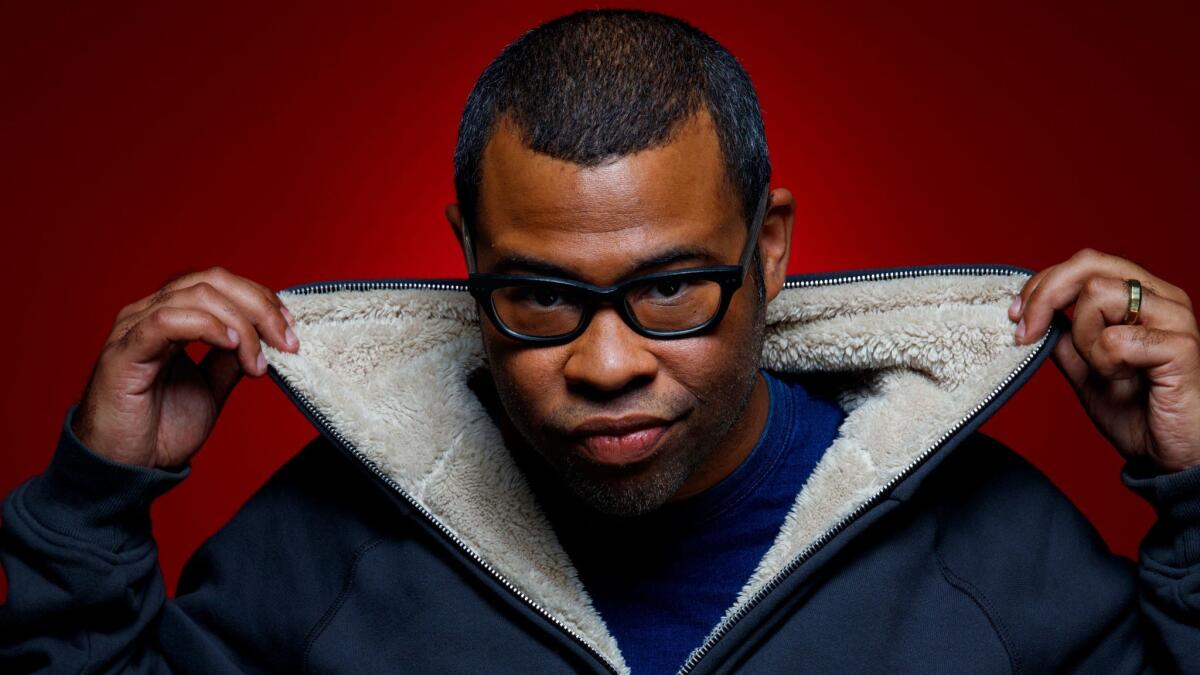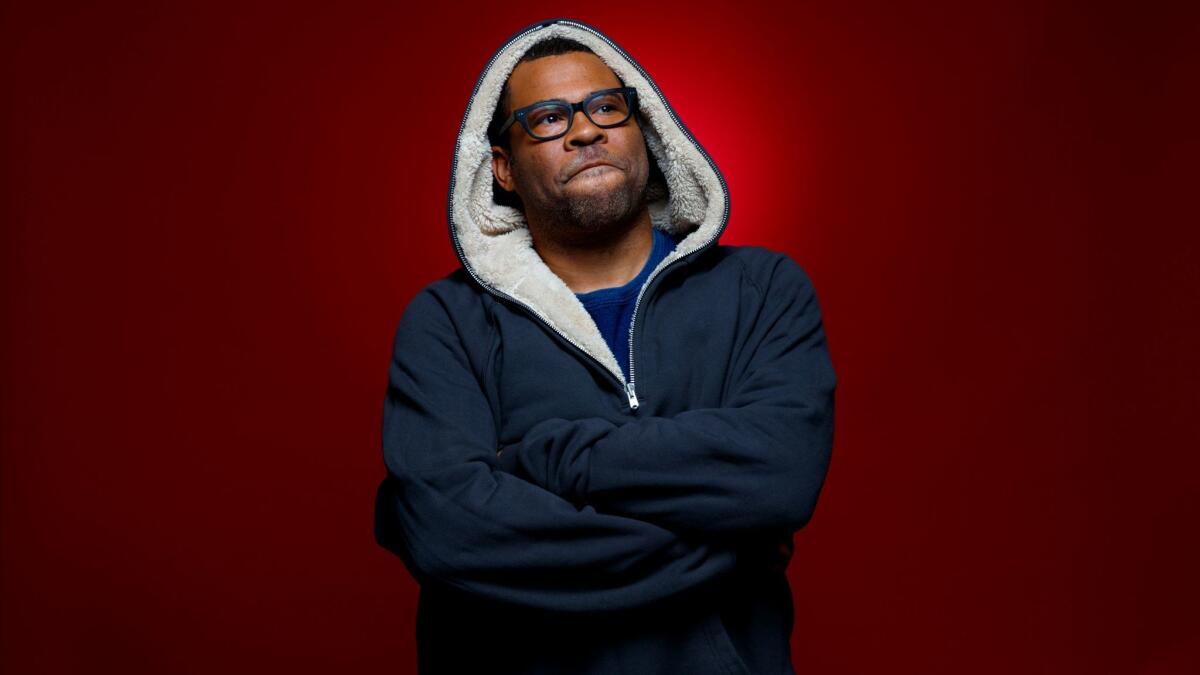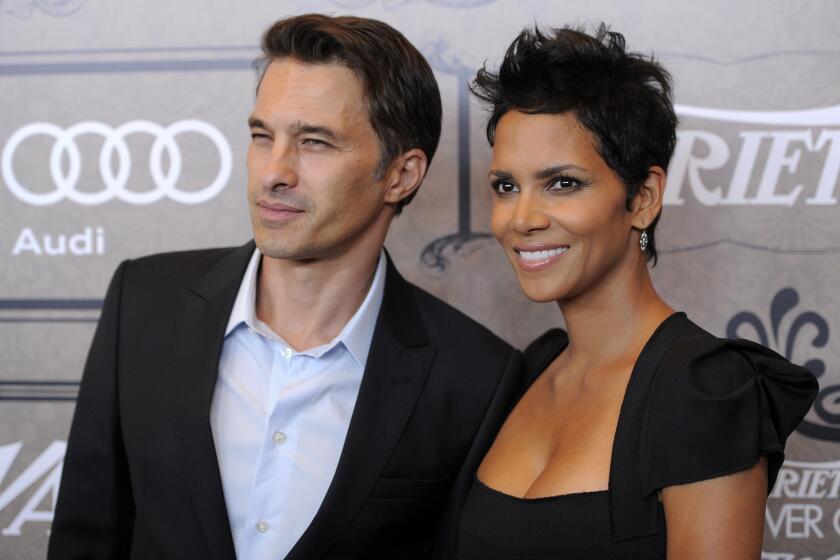Jordan Peele on ‘Get Out,’ the horror film about racism that Obama would love

Jordan Peele never thought his directorial debut “Get Out,” a horror spin on “Guess Who’s Coming to Dinner” for the post-Obama age, would ever actually make it to the big screen.
“I said, ‘You want to hear a cool story?’” the comedian-turned-filmmaker says of his pitch to a producer years ago, teasing a thriller about an African American man who goes home to meet his Caucasian girlfriend’s parents only to suspect insidious goings-on in her affluent liberal hometown. “The caveat is: No one will make this movie.’”
Happily for Peele, 38, a comedy star best known for his sketch show “Key & Peele,” his run on “MADtv” and last year’s “Keanu” movie, he was wrong.
With backing from QC Entertainment, Blumhouse Productions (the company behind horror hits “Paranormal Activity” and most recently “Split”) and distribution from Universal Pictures, Peele turned the pitch into a script filled with scares, laughs and searing social commentary about race and racism in America.
Little Haley Joel Osment in ‘The Sixth Sense’ can see dead people. Well, I can see racist people.
— Jordan Peele, writer-director of “Get Out”
Wanting to make sure his vision for the film would come to life with the nuance and edge it required, he made the leap to directing, a lifelong dream for the cinephile. The result is a taut, unrelenting and frequently hilarious horror-satire that’s scored a rare 100% positive rating from critics on Rotten Tomatoes, as well as raves from hip-hop luminaries like Chance the Rapper, who recently hosted a private screening of the film in Hollywood.
With nods to paranoia classics like “The Stepford Wives” and “Rosemary’s Baby,” Peele turns his lens on the “monster of racism” lurking in the manicured suburbs. Like his predecessors and cinema idols, he exploits the conventions of the horror genre to open a universal window into one of the most marginalized voices in contemporary America: that of the young black man.
“I’m so in awe of movies like ‘Alien,’ ‘Aliens,’ ‘The Shining,’ ‘Edward Scissorhands,’ most [Steven] Spielberg films — entertaining, ‘give the audience what they want’ movies,” Peele said on a sunny afternoon in downtown Los Angeles.
Growing up in New York, Peele would spend his nights obsessively poring over the films of Spielberg, Stanley Kubrick and David Cronenberg, favoring horror titles among his collection of more than 300 VHS movies.
“My friend and I would spend the better part of an evening figuring out what to watch. While other teenagers were getting laid, I was just trying to decide between ‘Dead Again’ and ‘The First Power’ for the third time.”
But one of his favorite movies — Ridley Scott’s “Thelma and Louise” — also taught him how effectively film can open audiences to experiences outside of their own.
“ ‘Thelma and Louise’ was a pretty important film for me, and still is,” Peele said. “It’s a social film about many things — gender, freedom — and it puts someone like me into the place of these protagonists. Watching that movie, you are living through the eyes of these women. It’s an inspiring movie that affected me so much. And until I saw it I wouldn’t have guessed that it had anything for me.”

The trailer for “Get Out,” written and directed by Jordan Peele.
“Get Out” puts its audience into the shoes of Chris (Daniel Kaluuya), a New York City photographer who joins his girlfriend, Rose (Allison Williams), on a weekend trip home to meet her parents (Bradley Whitford and Catherine Keener). He’s apprehensive about how her family will react to their interracial romance, despite her reassurances. (“My dad would vote for Obama for a third term if he could,” she insists.) But as odd encounters rack up, he begins to wonder if the paranoia and fear is all in his head.
“Part of being black in this country, or being a minority in this country, is about feeling like we’re perceiving things that we’re told we’re not perceiving,” said Peele. “It’s a state of mind. It’s a piece of the condition of being African American, certainly, that people may not know. They may not realize the toll that it does take — even if the toll is making us doubt ourselves.”
“Little Haley Joel Osment in ‘The Sixth Sense’ can see dead people. Well, I can see racist people,” he chuckled, his smile fading to a more sober expression. Although he couldn’t have planned for its unexpectedly acute real world relevance, “Get Out” arrives in theaters at a time of post-election tumult and terror among the country’s minority population under President Trump’s first two months in office.
“It’s not impossible to think why someone might miss a deeper, darker, crazy twist, because we do have this absurd actuality that we’re dealing with,” he said.
This film is how racism feels. You get paranoid and you can’t talk about it. You can’t voice it.
— Daniel Kaluuya, star of “Get Out”
He cast Kaluuya after watching the 27-year-old British actor’s breakout turn on an episode of “Black Mirror.” Kaluuya was already a fan of Peele’s comedy work — he and Emily Blunt spent their downtime watching “Key and Peele” in their trailers on the set of “Sicario,” he remembers — but found in Peele’s script an urgency that reflected familiar trauma onto the screen.
“That party sequence is why I really wanted to do this film, because I’ve been to that party,” Kaluuya said of a scene in which Chris politely navigates a series of white strangers whose pleasantries are edged with passive-aggressive racist undertones.
Kaluuya, who got his start on the hit British series “Skins” and is currently filming Marvel’s “Black Panther” for “Creed” director Ryan Coogler, delivers a nuanced performance that builds as the dread mounts. In one scene, his wide, expressive eyes stream unblinking tears, conveying a horrifically visceral feeling of physical and metaphorical powerlessness.
“This film is how racism feels,” said Kaluuya. “You get paranoid and you can’t talk about it. You can’t voice it. No one around you gets it, so you can’t speak about it. And in the end it just comes out in a rage.”

You know Obama’s got a devilish sense of humor. I know he’ll love it. . . . I can’t wait for Trump to see it, either.
— Jordan Peele, director
“Get Out” makes black lives matter far more than they traditionally have in movies, particularly in the horror genre, simply by depicting the reality of being a marginalized minority in white-dominated spaces.
“Those are the times you have to bite your lip, when an officer’s disrespecting you, in order to get by. In order to have freedom. In order to not be strip searched. In order to not be imprisoned,” said Kaluuya. “So you circle at the party, having to smile, because if you stand up and want to go, you’re the troublemaker, you’re the nuisance, because you are not playing the game — you’re not making everybody else feel comfortable.”
“Get Out” premiered as a surprise screening in January at the prestigious Sundance Film Festival, garnering glowing early reviews. The critical acclaim and strong box office tracking, with reports expecting an opening weekend take to quadruple the film’s $5-million production budget, put Peele’s career as a multi-hyphenate filmmaker in a promising position.
“I’ve done enough time in sketch comedy where you know that you’re going to piss people off, and you know that that’s not the end of the world, and that that’s OK,” said Peele, who is developing several feature film thrillers similarly built around contemporary social ills.
Emboldened by the recent successes of films and television show like “Straight Outta Compton,” Donald Glover’s “Atlanta” and Issa Rae’s “Insecure,” and the accomplishments of director Ava DuVernay helming “Selma,” “13th” and “A Wrinkle in Time,” he sees change coming to a Hollywood that has long resisted diversity.
“The theory that black doesn’t sell overseas is . . . . We need to give more diverse points of views the platforms to do good work. And I think part of the key is for the underdogs to realize that this is a possible aspiration,” said Peele. “I want to produce untapped voices, find people and help them get their platform.”
Peele’s push into directing comes at a time in America when socially provocative mainstream fare has the potential to permeate the national consciousness and drive vital conversations about race, inclusion and empathy for otherness.
“I feel like we’re entering a time now when it’s not as much about being mad as it is about being strategic,” he said. “I believe Barack Obama when he says progress isn’t a straight line. We just have to mitigate the potential damage and get through this together. I think art is going to play a huge part in that.”
To Peele’s knowledge, former President Obama, who famously tapped his comedy partner Keegan Michael Key to bring the duo’s “Obama Anger Translator” sketch to the 2015 White House Correspondents Dinner, hasn’t yet seen “Get Out” — although former first daughter Malia Obama was in attendance at the film’s Sundance premiere.
“You know Obama’s got a devilish sense of humor,” Peele grinned. “I know he’ll love it.” He paused, his comedy senses tingling, teeing up a joke.
“I can’t wait for Trump to see it, either. You know he definitely consumes content. He probably spends 10 hours a day watching news and Netflix,” he smiled. “He probably binge-watches shows on his iPhone during national security meetings. I’m sure he’s caught up with ‘The OA’ at this point.”
ALSO
Jordan Peele explains ‘Get Out’s’ creepy milk scene, ponders the recent link between dairy and hate
How Allison Williams mined the horrors of white privilege for ‘Get Out’
Jordan Peele’s ‘Get Out’ — the scariest movie at Sundance
More to Read
Only good movies
Get the Indie Focus newsletter, Mark Olsen's weekly guide to the world of cinema.
You may occasionally receive promotional content from the Los Angeles Times.









